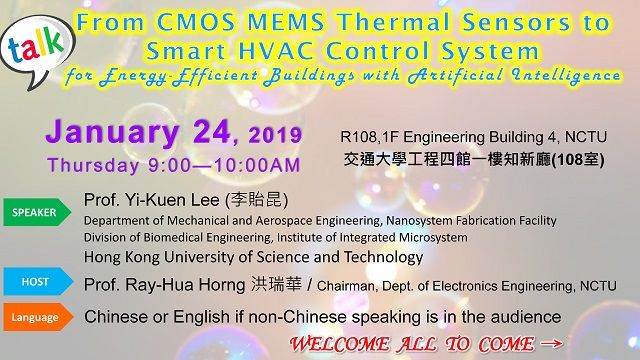演講/活動
2019-01-19 16:39:18陳秋雲( #TALK 2019.1.24 ) From CMOS MEMS Thermal Sensors to Smart HVAC Control System for Energy-Efficien
( #TALK 2019.1.24 ) From CMOS MEMS Thermal Sensors to Smart HVAC Control System for Energy-Efficient Buildings with Artificial Intelligence
~~~WELCOME ALL TO COME →
#Time January 24, 2019 Thursday 9:00—10:00AM
#Venue R108,1F Engineering Building 4, NCTU
交通大學工程四館一樓知新廳(108室)
#Speaker
Prof. Yi-Kuen Lee (李貽昆)
Department of Mechanical and Aerospace Engineering, Nanosystem Fabrication Facility
Division of Biomedical Engineering, Institute of Integrated Microsystem
Hong Kong University of Science and Technology
#Host Prof. Ray-Hua Horng 洪瑞華 / Chairman, Dept. of Electronics Engineering, NCTU
#Language Chinese or English if non-Chinese speaking is in the audience
#Abstract
The world’s population has reached more than 7.3 billion in 2015 and will increase to about 11.2 billion in 2100. The problems of energy and global environmental change are intense. It is extremely critical to develop new energy-efficient building technology with the low-carbon footprint for sustainable development which can save 2 Gt CO2 by 2050 to avoid extreme global climate change. On the other hand, advances in the semiconductor industry in the past six decades have enabled low-cost high-performance integrated circuits (IC). One of the emerging high impact technologies will be the Internet of Things (IoT). In particular, sensors are one of the five pillars in IoT according to the CES Chief economist. Low-cost CMOS MEMS sensors can be a promising solution for Smart Energy-Efficient Buildings. I will introduce the basic research of CMOS MEMS thermal flow sensors and thermal accelerometers and the potential applications. The theoretical modeling and nonlinear SPICE model of thermal flow sensors enables the system-level integration and optimization of CMOS MEMS sensors with integrated microelectronics. This optimization enabled the integrated thermal flow sensor to achieve the extreme dynamic range of input flow velocity, ranging from 0.5 mm/s (able to solve the problem of current smart HVAC systems) to 73 m/s (=262.8 km/h, able to measure super typhoon of which the air speed is larger than 185 km/h). With the advanced micro flow sensor and sensor fusion technology, we demonstrated low-cost high-performance energy/BTU sensor and Predictive Mean Vote (PMV) sensor. In addition, I will present the ongoing HKUST-MIT research project to develop Smart HVAC control system for Energy-Efficient buildings (EeB) using CMOS MEMS sensors, thermochromic smart windows (actuators), and information theory-based Artificial Intelligence.

~~~WELCOME ALL TO COME →
#Time January 24, 2019 Thursday 9:00—10:00AM
#Venue R108,1F Engineering Building 4, NCTU
交通大學工程四館一樓知新廳(108室)
#Speaker
Prof. Yi-Kuen Lee (李貽昆)
Department of Mechanical and Aerospace Engineering, Nanosystem Fabrication Facility
Division of Biomedical Engineering, Institute of Integrated Microsystem
Hong Kong University of Science and Technology
#Host Prof. Ray-Hua Horng 洪瑞華 / Chairman, Dept. of Electronics Engineering, NCTU
#Language Chinese or English if non-Chinese speaking is in the audience
#Abstract
The world’s population has reached more than 7.3 billion in 2015 and will increase to about 11.2 billion in 2100. The problems of energy and global environmental change are intense. It is extremely critical to develop new energy-efficient building technology with the low-carbon footprint for sustainable development which can save 2 Gt CO2 by 2050 to avoid extreme global climate change. On the other hand, advances in the semiconductor industry in the past six decades have enabled low-cost high-performance integrated circuits (IC). One of the emerging high impact technologies will be the Internet of Things (IoT). In particular, sensors are one of the five pillars in IoT according to the CES Chief economist. Low-cost CMOS MEMS sensors can be a promising solution for Smart Energy-Efficient Buildings. I will introduce the basic research of CMOS MEMS thermal flow sensors and thermal accelerometers and the potential applications. The theoretical modeling and nonlinear SPICE model of thermal flow sensors enables the system-level integration and optimization of CMOS MEMS sensors with integrated microelectronics. This optimization enabled the integrated thermal flow sensor to achieve the extreme dynamic range of input flow velocity, ranging from 0.5 mm/s (able to solve the problem of current smart HVAC systems) to 73 m/s (=262.8 km/h, able to measure super typhoon of which the air speed is larger than 185 km/h). With the advanced micro flow sensor and sensor fusion technology, we demonstrated low-cost high-performance energy/BTU sensor and Predictive Mean Vote (PMV) sensor. In addition, I will present the ongoing HKUST-MIT research project to develop Smart HVAC control system for Energy-Efficient buildings (EeB) using CMOS MEMS sensors, thermochromic smart windows (actuators), and information theory-based Artificial Intelligence.


